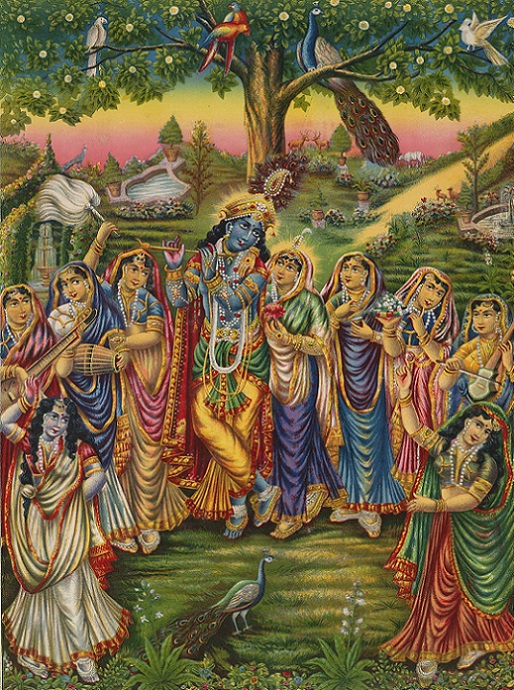(Click to enlarge vintage painting of Krishna dancing with the gopis under a kadamba tree, 1895)
"So here is Kṛṣṇa. From śāstric evidences, by His opulences, by His power... Because Bhagavān means full of six opulences. Aiśvaryasya samagrasya vīryasya yaśasaḥ śriyaḥ (Viṣṇu Purāṇa 6.5.47). He must be the richest. He must be the strongest. He must be the most famous. He must be the most beautiful. He must be the great renouncer. In this way, that is the definition of God. So that definition is confirmed by Lord Brahmā: īśvaraḥ paramaḥ kṛṣṇaḥ. Īśvara means controller. Unless one is powerful, how he can control? So every one of us is little, a small controller. Somebody controls in his office. Somebody controls in his family life. Somebody controls a few factories. There are controllers. But nobody can say that 'I am the supreme controller.' That is not possible. The supreme controller is Kṛṣṇa.
So this Kṛṣṇa consciousness movement means we are trying link up our connection with the supreme controller. We do not wish to become the controller. We want to be controlled—but by the supreme controller, not by others. That is our proposition. Just like generally, one who is in service, he hankers after government service. Because it is natural conclusion that 'If I have to serve somebody, why a petty merchant? Why not take government service?' So that is our proposition, that we have to serve. We cannot do but serve. Any one of us. That is our constitutional position. Any one of us, we are sitting here, we are servant. Every one of us is servant. So our proposition is that you are servant in any case. Why not become servant of God? That is our proposition. That is Kṛṣṇa consciousness movement.
So kāmādīnāṁ kati na katidhā pālitā durnideśāḥ. We are servant of our senses, kāma-krodha-moha-mātsarya, all these. By, dictated by our lusty desires, we do anything which is abominable. Teṣāṁ kati na katidhā pālitā durnideśāḥ. So we are servant, everyone. Therefore, Caitanya Mahāprabhu says, jīvera svarūpa haya nitya-kṛṣṇa-dāsa. Our real constitutional position is that we are eternal servant of God, Kṛṣṇa. That is our position. But in this material condition of life, every one of us is trying to become the master. That is the struggle for existence. Everyone is trying: 'I shall become the master. I shall become the Supreme.' But our position is servant. So this is called illusion. I am not master. I am servant. But I am trying to become master artificially. That is struggle for existence. And mukti means, liberation means, when you give up this wrong idea that 'I am master,' and try to become the servant of the Supreme. That is called liberation. Liberation does not mean that after liberation we'll have a big, gigantic form or so many hands, so many legs. Liberation means to become liberated from the wrong consciousness. That is liberation.
The wrong consciousness is that 'I am master.' So we have to change this consciousness. That is Kṛṣṇa consciousness movement. One has to understand thoroughly that he's not master. He's servant. He's completely dependent on the supreme will. If we do not surrender unto the supreme will, then we have to surrender unto the will of māyā. We have to remain a servant. If we don't..., reject service, or servitude of the Supreme Lord, then we have to become the servant of the senses. That is māyā. Actually, that is going on. The whole world is serving different types of senses."
(Srila Prabhupada Lecture, Hyderabad, November 18, 1972)
.
.
